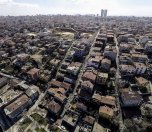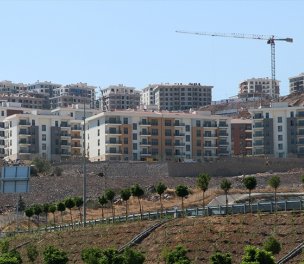Between 450,000 and 750,000 houses are vacant in İstanbul, the Deputy Secretary General of the İstanbul Metropolitan Municipality (İBB), Buğra Gökçe announced on his social media today.
A significant number, as the total amount of registered residences was 6.4 million in 2020, İstanbul Planning Agency (İPA)'s figures show.
Given the city's recent housing and rental crises, it is surprising to find many unoccupied homes in İstanbul.
In the last years, housing prices have risen sharply in Turkey, particularly in major cities. Endeksa, a real estate portal, reports that the average annual rent hike was over 197% as of the end of March 2023, despite a 25 percent rent increase cap introduced in Mid-2022.
In İstanbul, the average rent of a 120 square-meter apartment has tripled between April 2021 and November 2022.
Konut erişimini kısıtlayan ve konut piyasasını dengesizleştiren önemli bir faktör: Boş konut sorunu.
— Dr. Buğra Gökce (@gokcebugra) May 1, 2023
Yaptığımız çalışmalara göre sadece İstanbul'da 450 bin ile 750 bin marjında boş konut var.
Deprem güvenliği açısından da önemli olan bu konuyu biraz değerlendirmek isterim???? pic.twitter.com/1PtfWrRfz1
'Erdoğan capitalism'
The political sphere has not remained indifferent to these significant surges. Ahead of the upcoming parliamentary and presidential elections on May 14, both the ruling government and the opposition have addressed Turkey's housing problems.
In a TV interview on April 25, Justice Minister Bekir Bozdağ hinted at measures that could lead to imprisonment if someone engages in exorbitant rent hikes.
Kemal Kılıçdaroğlu, the joint presidential candidate of the main oppositional block, attributed the excessive rent increases to "Erdoğan capitalism" in a video published on April 29.
In the video, he promises that the Mass Housing Administration (TOKİ), a governmental agency responsible for providing affordable housing to low and middle-income citizens, will resume constructing such housing.
Furthermore, the Republican People's Party (CHP) leader vows to boost the social housing inventory by four times within five years and maintain the social housing rents at 20% of the minimum wage.
In addition, he pledges to prohibit the sale of homes to foreign buyers if his party wins the upcoming elections, stating that no foreigner would be allowed to buy a house until the housing problem of Turkey's citizens is resolved.
The oppositional contender also expressed his intention to send refugees back to their home countries within two years to stabilize house prices, regardless of being called discriminatory or racist.
— Kemal Kılıçdaroğlu (@kilicdarogluk) April 29, 2023
'There is no issue with the quantity of available housing'
Critics suggest that the considerable number of unoccupied homes is also a consequence of profit-driven housing policies implemented by the Justice and Development Party (AKP) over the years.
İBB Deputy General Secretary Gökçe points out in his tweets that İstanbul's "unacceptable" and "market destabilizing" amount of vacant housing consists of a segment of houses built for the middle and upper-income groups, constructed after the release of public lands for urbanization.
These urban transformation ventures built in the last two decades are often called "rental transformation" projects by skeptics, claiming that the government focuses on boosting the economy through profitable construction contracts and public-private cooperation.
According to a 2020 İPA report, out of 51,000 flats built by TOKİ only 678 were for low-income groups, and a significant number of the 153,000 buildings constructed after 2008 remain vacant.
Furthermore, official figures indicate that between 2002 and 2020, Turkey witnessed the construction of about 12.5 million new houses, while approximately 4 million new households were formed, indicating that at least three dwellings were built per new household.
"Especially in the major cities, there is no issue with the quantity of available housing," noted Prof. Dr. Osman Balaban, a lecturer at the City and Regional Planning Department of Middle East Technical University (METU), in an article published in Birgün newspaper, similarly remarking that many buildings are constructed primarily as an investment tool rather than for housing people.
'New, high-quality, and safe social housing'
Gökçe emphasizes that vacant and safe houses in İstanbul could be used to shape short, medium, and long-term housing policies by making them available to the public.
Additionally, these unoccupied dwellings can aid in addressing another imminent threat looming over the city, a catastrophic earthquake that may hit İstanbul's 15 million+ population at any moment.
Fears of İstanbul's 'big one' resurfaced following the disastrous earthquakes on February 6, resulting in over 50,000 deaths, injuring over 100,000 people, and destroying or severely damaging over 227,000 buildings in 11 provinces.
İstanbul faces 500,000 damaged buildings, with 86,000 collapsing or suffering severe devastation in case of a 'big one', İPA recently indicated.
The proposal put forward by Gökçe recommends establishing a housing fund using taxes from unoccupied dwellings to support the construction of new, high-quality, and safe social housing.
"It is also crucial to encourage renting safe vacant houses to people living in risky buildings. This can be made possible by introducing different tax and incentive regulations. Vacant houses can be used as social housing to increase earthquake resistance and renew our building stock in İstanbul," the city planner writes, ending his thread by emphasizing that protecting the right to housing remains crucial. (WM)





.jpg)



.jpg)
sa.jpg)
.jpg)
.jpg)
.jpg)
.jpg)
.jpg)